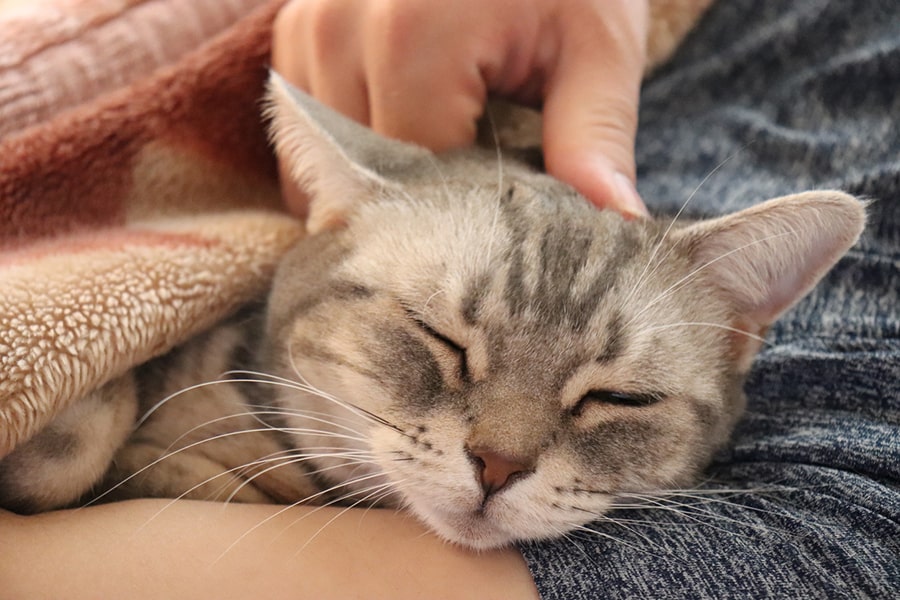Paws on the Move: Commuting with Pets
Whether you're commuting by car, bus, or train, find tips on how to bring your cat or dog along for the journey.
Watching your cat have a seizure is a scary experience. They may drool, convulse, and even lose consciousness. Here's what you should know about seizures and epilepsy in cats.
Like humans and dogs, cats can be diagnosed with epilepsy. It's a chronic condition characterized by recurring seizures. A seizure is caused by abnormal electrical activity in the brain.
Seizures can differ in duration and severity. Some happen quickly with signs you may not even notice. Others can last a few minutes with more frightening symptoms, including convulsions and collapse.
Typically, the brain is able to reset itself and return to normal functioning. However, it can take a while for the cat to feel like themselves again.
It's not always possible to determine the cause of seizures in cats. However, some common reasons for cat seizures include:

There are two types of cat seizures, which have different symptoms.
Partial seizures, also called focal seizures, impact a specific area of the brain. They can have subtle symptoms that you might not even notice. These can include drooling, facial twitching, growling, and abnormal posture or movements.
A generalized or grand mal seizure happens when there is abnormal electrical activity throughout the brain. Symptoms can include:
A generalized seizure can last from around one to five minutes. They can also occur in clusters where one happens immediately after another or with a short period of recovery in between them. After these seizures, cats may appear wobbly, blind, confused, and exhausted.
The first stage of a seizure is known as the aura or pre-ictal phase. During this period, your cat may seem nervous or restless. They might shake, salivate, or vocalize. Cats also tend to hide when they aren't feeling right, so you may not see your cat during this time. The aura can pass within minutes or last for a few hours.
The second phase is called the ictal stage, which is the main part of the seizure. This is when you would see the most noticeable symptoms. Once the ictal phase ends, your cat will enter the post-ictal stage. This phase is characterized by confusion, disorientation, and sometimes temporary blindness.
If your cat has a seizure, stay calm and wait it out. You can't snap them out of it, and you could get nipped at or scratched if you try to intervene. Remember that most seizures stop on their own after a couple of minutes.
Avoid touching your cat unless they're at risk of getting hurt. For instance, you may need to gently move them away from the top of the stairs or block them from falling off a couch. Make sure they can't knock anything over on themselves too.
Once the seizure is over, you should contact your veterinarian, even if it passed quickly. If your cat has a seizure that lasts more than five minutes or multiple episodes with little recovery in between, you should take them to the veterinarian immediately. This can be a life-threatening situation. Wrap your cat up carefully in a towel or blanket to transport them safely.
Feeding your cat an appropriate diet can help them stay healthy and avoid conditions that might lead to seizures. Learn about cat nutrition trends.
Your veterinarian will ask you about your cat's seizure activity. You'll want to be ready to answer questions including:
If you have your phone handy during a seizure, you can take a video to show your veterinarian. This can help them more accurately diagnose your cat.
Your veterinarian will also need to know about your cat's health history and potential exposure to toxins. They'll likely conduct diagnostic tests, such as a urinalysis, blood work, or MRI, to try to determine the cause.

Treatment of seizures is focused on managing the underlying condition if it can be diagnosed. In any case, your veterinarian may recommend medication to help reduce the risk and severity of seizures.
Be sure to follow your veterinarian's dosage instructions carefully. If you change the dose amount or stop the medication suddenly, the seizures may resume and even get worse.
Do you need to give your cat a pill? You can try hiding it in their regular food or use a pill pocket, which is a treat with a hollow center that can hold a pill.
Since the cause of seizures is often unknown or due to things out of your control, like a tumor, it's not always possible to prevent them. But you can help make sure your cat is safe from head injuries or toxic exposure. For instance:
You should be aware of common household dangers that can harm your cat, including pesticides, antifreeze, cleaning supplies, and toxic plants.
Fortunately, most cats recover quite well after a seizure. In some rare and tragic cases, cats can die during a seizure. This is usually due to injuries that happen during the incident. Frequent, repeated seizures can put your cat at greater risk for getting hurt and possibly cause damage to the brain.
It's important to follow your veterinarian's recommendations to manage the condition and treat any underlying illness. With proper care, cats who have been diagnosed with epilepsy can live a long and happy life.
If your cat has a seizure or is diagnosed with epilepsy, pet insurance can help you manage the costs of veterinary care. It can cover diagnostic tests, like X-rays, MRI, urinalysis, and bloodwork, and anti-seizure medications. It also includes coverage for injuries, which would come into play if your cat got hurt during a seizure.
Find out if pet insurance is worth it for you and your feline family member.
The information presented in this article is for educational and informational purposes only and does not constitute or substitute for the advice of your veterinarian.